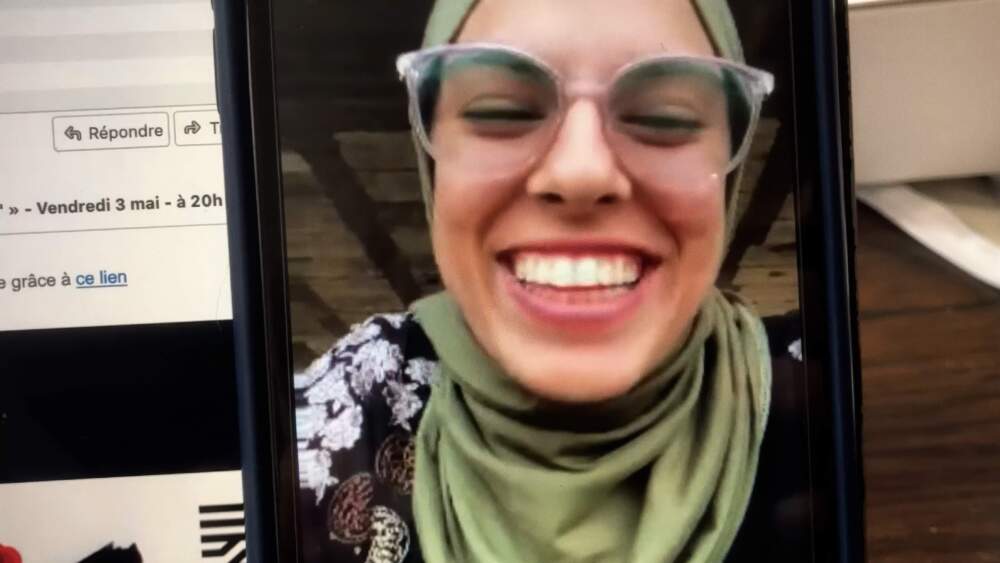
Fatma Hassana’s smile was wide and inviting. She seemed to smile instinctively, even in sadness. In the documentary “Put Your Soul on Your Hand and Walk,” that smile becomes the subject as much as Hassona herself — the map upon which we learn to read her hope, her resolve, and her sorrow.
“Put Your Hand on Your Soul and Walk,” which screens at the Brattle Theatre on Tuesday, Oct. 21, as part of the Boston Palestine Film Festivaldepicts one year of Hassona’s life in Gaza under Israeli siege, culminating in her death in an Israeli airstrike shortly before the documentary premiered at the 2025 Cannes Film Festival.
“She would say these things like, ‘Well, they bomb next door. They just killed two of our neighbors,’ and then be smiling or laughing,” said director Sepideh Farsi on a recent call from Paris. “But it wasn’t because she didn’t care, obviously. It’s a smile to hold onto, because there’s nothing else left.”
Farsi, an Iranian filmmaker living in political exile in France, originally hoped to enter Gaza to document the war.
“We heard about how the Israelis coped, how the Europeans thought of the whole thing, the scope of the Americans, the Egyptians, the Qataris,” Farsi said. “Palestinians were nowhere to be seen. Nobody was talking to them, nobody was questioning them.”
When she was unable to enter the enclave, Farsi instead began a correspondence with Hassona, a then-24-year-old Palestinian photographer living in Gaza City. “Put Your Soul on Your Hand and Walk” documents the women’s year-long correspondence. Hassona would make the long trek to a friend’s house to get internet reception, and Farsi would film their video calls. They would often speak for an hour at a time.
“Life had narrowed down to being locked up in a room,” Farsi said. “And then her face and her expressions somehow became the territory I was looking for. I would then see her eyes change, her smile, that amazing smile she has — had — always on her face, that changed colors and shades, depending on her moods.”
Most of the movie consists of footage of these phone calls, just Hassona’s face inside a little screen. It’s an unusual way to make a documentary about war, “but this filmmaking technique works,” said Michael Maria, the director of programming for the Boston Palestine Film Festival. “It’s almost two–hour film and it holds our attention throughout the entire course.”
The Gaza health ministry reports that over 67,000 Palestinians have been killed in Israel’s offensive, which has prompted accusations of genocide from scholars and the United Nationsa charge Israel denies. But the portrait of Hassona that emerges in the documentary captures what numbers cannot, Maria said.
“It brings us to real humanization,” he explained. “We see Fatma as a charismatic, artistic and smart person with really deep ambitions to see the world beyond Gaza.”
When it was safe to leave her home, Hassona would roam the city with her camera, capturing moments of daily life. Her photographs are interspersed throughout the film. They depict ruins and rubble stretching to the skyline, with the occasional shock of color from an umbrella or piece of clothing. She photographs children: a group crammed into the back of a truck, a little girl with a bird perched on her finger. In one series, a boy uses a hose to clean up blood on the ground.
In the film, Hassona shares her poetry and a recording of herself singing, her voice confident over an out-of-tune guitar. She and Farsi talk about many things besides the war: literature, art, religion. Hassona seesaws between optimism and despair. But whenever she picks up the phone to speak to Farsi, she is good-natured.
“It is something to watch someone cry or curse or be angry about things that are horrible, like talking about a genocide. But it’s something else to watch somebody very calm, dignified, with a smile, telling you about these same things,” Farsi said. “I would feel ashamed. I would feel guilty.”
On April 15th, Farsi shared with Hassona that “Put Your Soul on Your Hand and Walk” would premiere at the Cannes Film Festival as part of its ACID independent film section. Early the next morning, Hassona and several of her family members were killed in an Israeli strike on their home. Israel said it was targeting a member of Hamas. The Palestinian Journalists Protection Center condemned the attack as part of a pattern of assaults against Palestinian journalists. Hassona was known for her photojournalism, which she speaks passionately about in the film.
“Although I have very little hope to live the life that I want,” Hassona says in one message to Farsi, “I have the idea that I must keep going, and I must document everything.”
“Put Your Soul on Your Hand and Walk” comes to Boston in the wake of a long-awaited ceasefire. But peace remains fragile. Farsi described her emotions as a balance between caution and hope.
“We talked about this so much, that this will end one day,” she said. “I so much wish to have been able to share this news with her.”